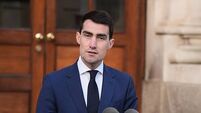Martin faces date with destiny
That is what the health minister has spent the last two years doing every time a crisis has erupted with some patient, hospital or health board.
The litany of crises Mr Martin was called on personally to tackle in the past three months bear witness to this: the premature death of baby Bronagh Livingstone after her mother was refused treatment in Monaghan General Hospital, the delayed cash settlement for liver transplant woman Sylvia O'Leary from his own constituency of Cork South Central, and the continuing Accident and Emergency debacle.













